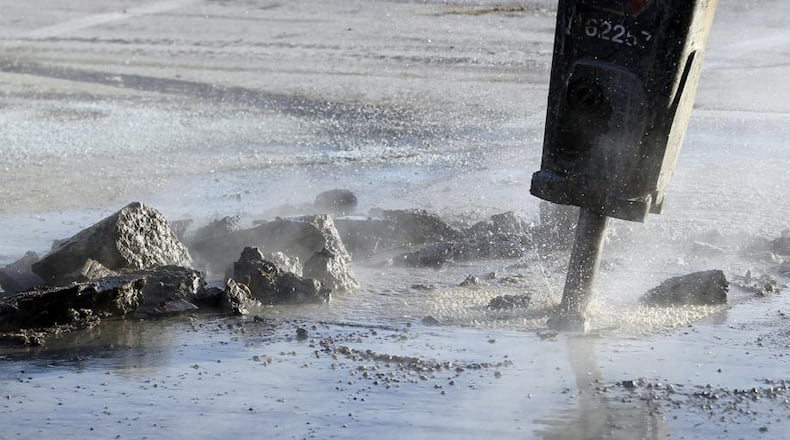“That means we never shut the water off,” Wooten said.
The water pressure may be lowered to prevent a greater loss of water and ease a repair, but not enough to let harmful bacteria into the system, she said.
RELATED: Brutal cold has been rough on local water mains
Dozens of area water main breaks have been reported since more than a week-long cold snap pulled temperatures below zero, but few customers have gone without service, said David Shade, Dayton’s division manager for water utility field operations.
“There’s really no inconvenience other than water in the street,” he said.
About 300 water main breaks are reported each year in the county’s 1,400 mile system while Dayton’s 792-mile system experiences about 120 breaks annually. A majority of the breaks occur in December, January and February as freezing heaves the ground around pipes — many in service beyond their lifespans — forcing the breaks, water officials said.
MORE: No water for Miami Twp. mobile home residents after pipes freeze
Even if a water main breaks near your house, it’s unlikely your service will be interrupted, Wooten said.
“We have a valve system throughout the water main system that allows us to isolate different areas of the system,” Wooten said. “So you might think that a main break impacts your house and it doesn’t.”
MORE: Increased drug use triggers new worry: water quality
In some instances, the system must be shut down to replace pipe. When this happens the water main is depressurized — which could allow bacteria or other harmful compounds into the piping — and a boil advisory is issued. Any time the pressure falls below 20 psi, the Ohio Environmental Protection Agency mandates a boil advisory.
Of about 60 water main breaks between the New Year’s weekend and Thursday, just four required boil advisories, two each in the Montgomery County and Dayton systems.
MORE: Ohio among worst for lead violations in water systems
A boil advisory should be heeded, but is often made in an overabundance of caution, Wooten said.
“A vast majority of the time, boil advisories are precautionary,” Wooten said. “They are not based on the fact we have found bacteria in the water.”
Shade said when issued, a boil advisory is typically limited to a one to three block area and lasts about 24 hours. Personnel go door-to-door and notify residents and place fliers both when an advisory is issued and when it is lifted. The county has a similar procedure.
Water main break 24-hours emergency numbers:
Montgomery County water customers
937-781-2678
City of Dayton water customers
937-333-4905
About the Author

